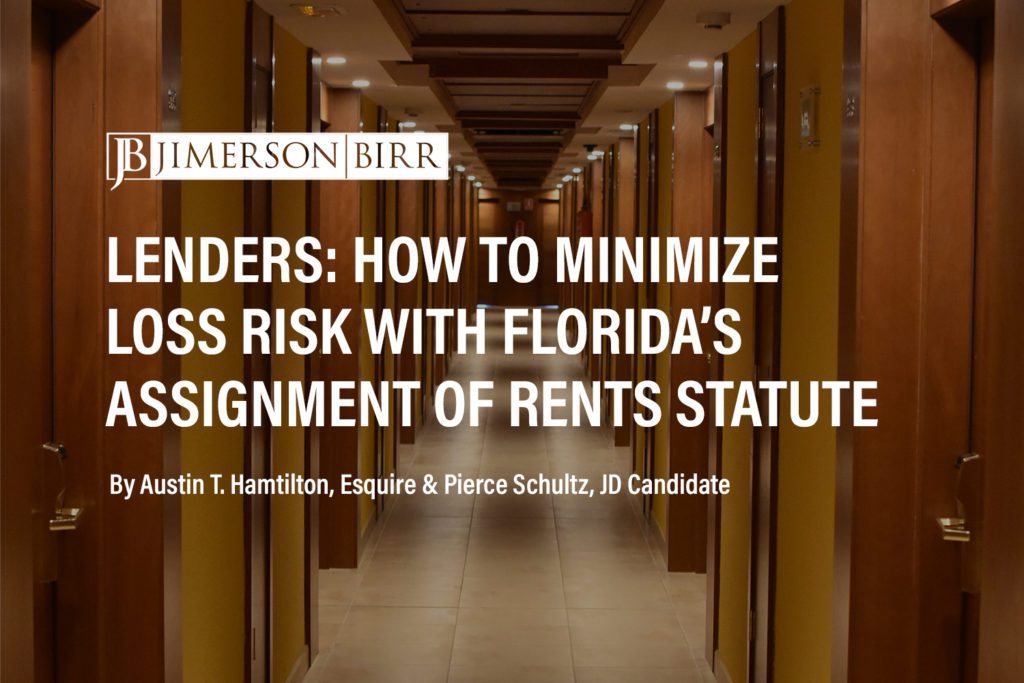Parts 1-3 of this series explored alternative pre-foreclosure loss mitigation options for lenders including acceleration and enforcement of personal guarantees. This article explores Section 697.07, Florida Statutes, which governs the assignment of rents.
Assignment of Rents under Section 697.07, Florida Statutes
Pursuant to Section 697.07, Florida Statutes, a mortgage or separate instrument may provide for an assignment of rents of real property or any interest therein as security for repayment of an indebtedness. §697.07, Fla. Stat. (2019). Under an assignment of rents, the mortgagee holds a lien on the rents of the mortgagor. However, and critically, in order to perfect a lien on rents, the assignment of rents must be recorded in the public records of the county in which the real property is located. §697.07(2).
Upon default by the borrower, the lender/mortgagee can enforce the assignment of rents provided the lender/mortgagee makes written demand to the borrower for payment of the rents. §697.07(3). Additionally, during a foreclosure action, the lender/mortgagee can request the borrower/mortgagor to deposit the collected rents into the registry of the court or in such other depository as designated by the court. §697.07(4).
With regard to the hotel, restaurant and entertainment industry, the initial question is whether hotel revenues are considered “rents” within the meaning of Section 697.07, Florida Statutes.
Are Hotel Revenues “Rents” under Section 697.07, Florida Statutes?
The answer to the question of whether hotel revenues constitute rent under Section 697.07, Florida Statutes, may depend upon the district in which the foreclosure action is pending. Specifically, the Fifth DCA and the Third DCA appear to conclude that hotel revenues do not constitute rent under Section 697.07, Florida Statutes. See Orlando Hyatt Assocs., Ltd. v. FDIC, 629 So. 2d 975, 976 (Fla. 5th DCA 1993); Terant v. Beltway Capital, LLC, 147 So. 3d 1103, 1106 (Fla. 3d DCA 2014) (noting that “rents” under Section 697.07 “do not include all general accounts receivable and business revenues generated from all commercial use of the subject property”). However, recently, the Fourth DCA in Seaspray Resort, Ltd v. UCF I Tr. 1, 260 So. 3d 333, 335 (Fla. 4th DCA 2018) recognized that the idea that Section 697.07 does not apply to hotel revenues stems from a line of bankruptcy cases decided in the early 1990s. However, the Seaspray Court provided that these early cases do not preclude sequestration of hotel revenue into the court registry during a foreclosure proceeding where the borrower has agreed to assign the revenue to the lender upon default. Id. at 335, n.1. Thus, the trial court did not abuse its discretion by requiring the borrowers to deposit all hotel revenue into the court registry pending final judgment. Id.
While the Fourth DCA’s decision in Seaspray is likely the better decision, the outcome may depend upon the language and breadth of the assignment of rents provision and whether the assignment of rents provision clearly intended for hotel revenues to constitute rent for purposes of Section 697.07, Florida Statutes.
Losing the Right to Collect Rents: Junior Foreclosure Sales
It is important to note that senior mortgage holders may lose the right to collect rents during the pendency of a foreclosure action if a junior mortgage holder has previously foreclosed on its junior mortgage. See Green Emerald Homes, LLC v. Residential Credit Opportunities Tr., 256 So. 3d 211, 215-16 (Fla. 2d DCA 2018).
In Green Emerald, a junior lienholder foreclosed on a parcel of property that had a senior mortgage. The purchaser at the junior foreclosure sale became the titleholder subject to the first/senior mortgage. After the purchase at the foreclosure sale, the first mortgagee filed an action to foreclose the first mortgage and moved for sequestration of the rents from the titleholder (i.e., the person who purchased the property at the foreclosure sale).
While the trial court granted the mortgagee’s motion to sequester rents, the Second DCA reversed because the titleholder was not a party to the assignment of rents agreement and was not an assignee of the agreement. Id. at 215. The Second DCA provided: “In the same way that a nonparty to the mortgage cannot enforce the terms of the mortgage with regard to attorney’s fees, neither can the mortgagor impose the obligations of the mortgage against a nonparty to the mortgage who has not otherwise assumed those obligations.” Id. at 216. Not only does this take money directly out of the pocket of the senior mortgage holder, but it also incentivizes the titleholder to delay the foreclosure action for as long as possible, leading to further losses to the lender/mortgagee.
To avoid this result, lenders/mortgagees need to regularly monitor the property records. If a junior lienholder files a foreclosure action, the senior lienholder should consider the potential effect that an eventual foreclosure sale may have on its rights, including its inability to enforce an assignment of rents under Section 697.07, Florida Statutes.
Conclusion
Florida’s assignment of rents statute provides lenders with an important tool for their arsenal in minimizing their losses upon default by the borrower. It is crucial to make sure that the opportunity is maximized. In that respect, sequestration of hotel revenues should be sought, and lenders should be careful not to sleep on their rights.
Next, part 5 of this series will provide a general overview of the commercial foreclosure process including practical considerations for lenders/servicers.
Continued Reading in this Mitigating Risks Associated with Hotel, Restaurant and Entertainment Industry Economic Challenge Series:

